Classic lemon meringue pie recipe with lots of tips and tricks for a perfect pie every time! No more weeping and shrinking. This’s the BEST!
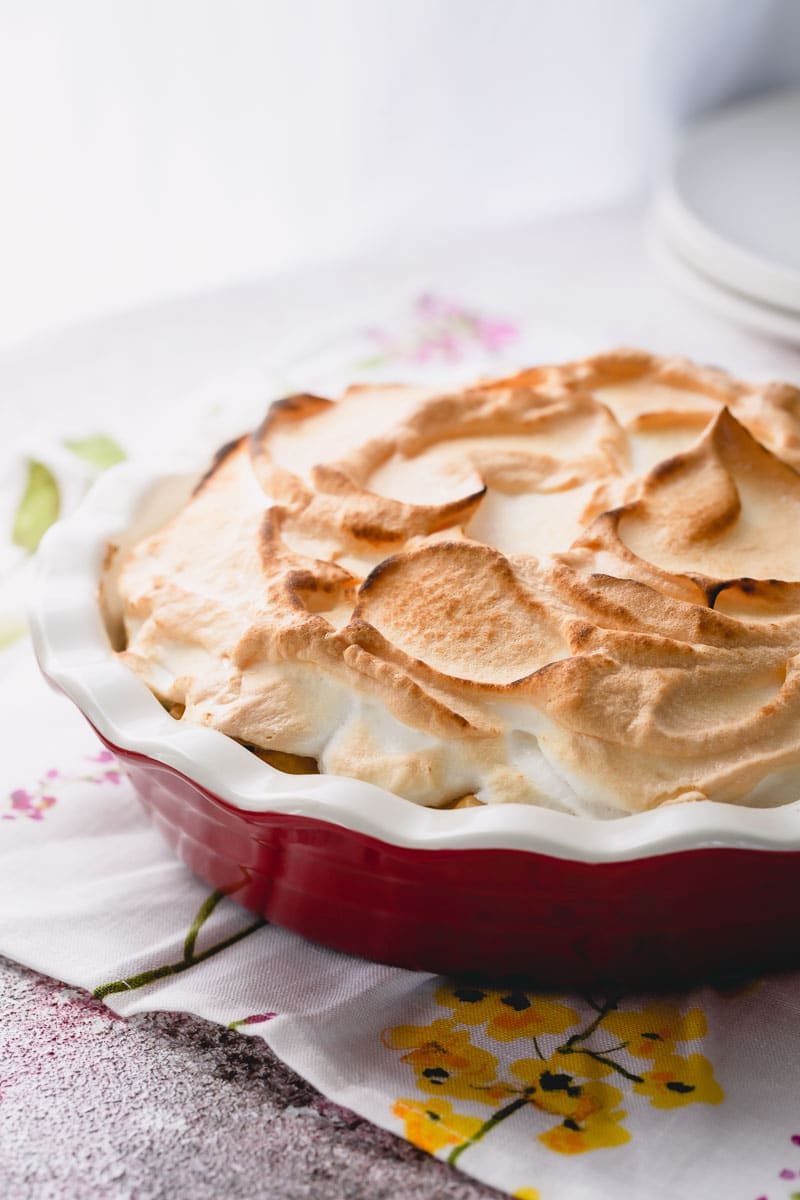
Table of Contents
- Why you’ll love this recipe:
- how to make lemon meringue pie recipe
- How to make lemon meringue pie crust:
- How to make lemon meringue pie filling:
- How to make meringue topping:
- HOW TO CUT LEMON MERINGUE PIE NEATLY:
- Lemon Meringue Pie Troubleshooting
- How to store lemon meringue pie:
- Do you have to refrigerate lemon meringue pie?
- How do you store lemon meringue pie overnight?
- Can you make meringue ahead of time?
- Can you freeze lemon meringue pie?
- Lemon Meringue Pie Recipe
I can never turn down a slice of lemon meringue pie!!! It’s our family’s favorite pie too. Light and airy meringue topping, silky smooth and creamy lemon curd filling and buttery flaky crust – who can resist?
This easy lemon meringue pie recipe is a keeper!
I shared this recipe back in 2013, and today I’m updating this post with fresh new photos and more tips and tricks to help you make the best lemon meringue pie from scratch!
Why you’ll love this recipe:
- Silky smooth lemon pie filling is firm enough to hold its shape when sliced, but not thick and gelatinous (think a jello-like consistency) at all.
- The filling is not cloyingly sweet filling, and is full of bright zesty lemon flavor.
- Cloud-like fluffy meringue topping is toasted till perfection. Tried and tested tips to avoid weeping and shrinking issues!
This post is jam-packed with tips and tricks to avoid common mistakes and create truly beautiful classic lemon meringue pie!
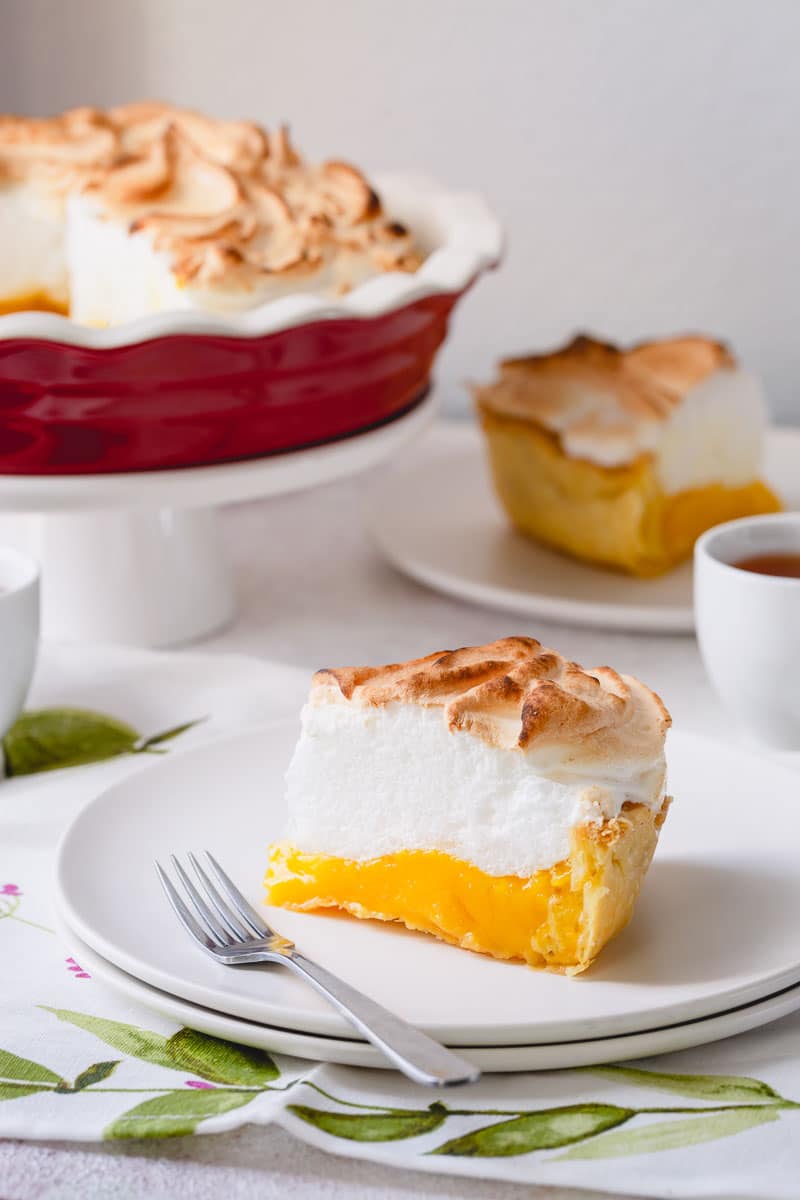
how to make lemon meringue pie recipe
This pie is fairly easy to make. However, there are a few common issues that prevent you from having the best experience, and we’ll address them here today.
But first, let me walk you through the entire process, and then we’ll talk about troubleshooting the common issues.
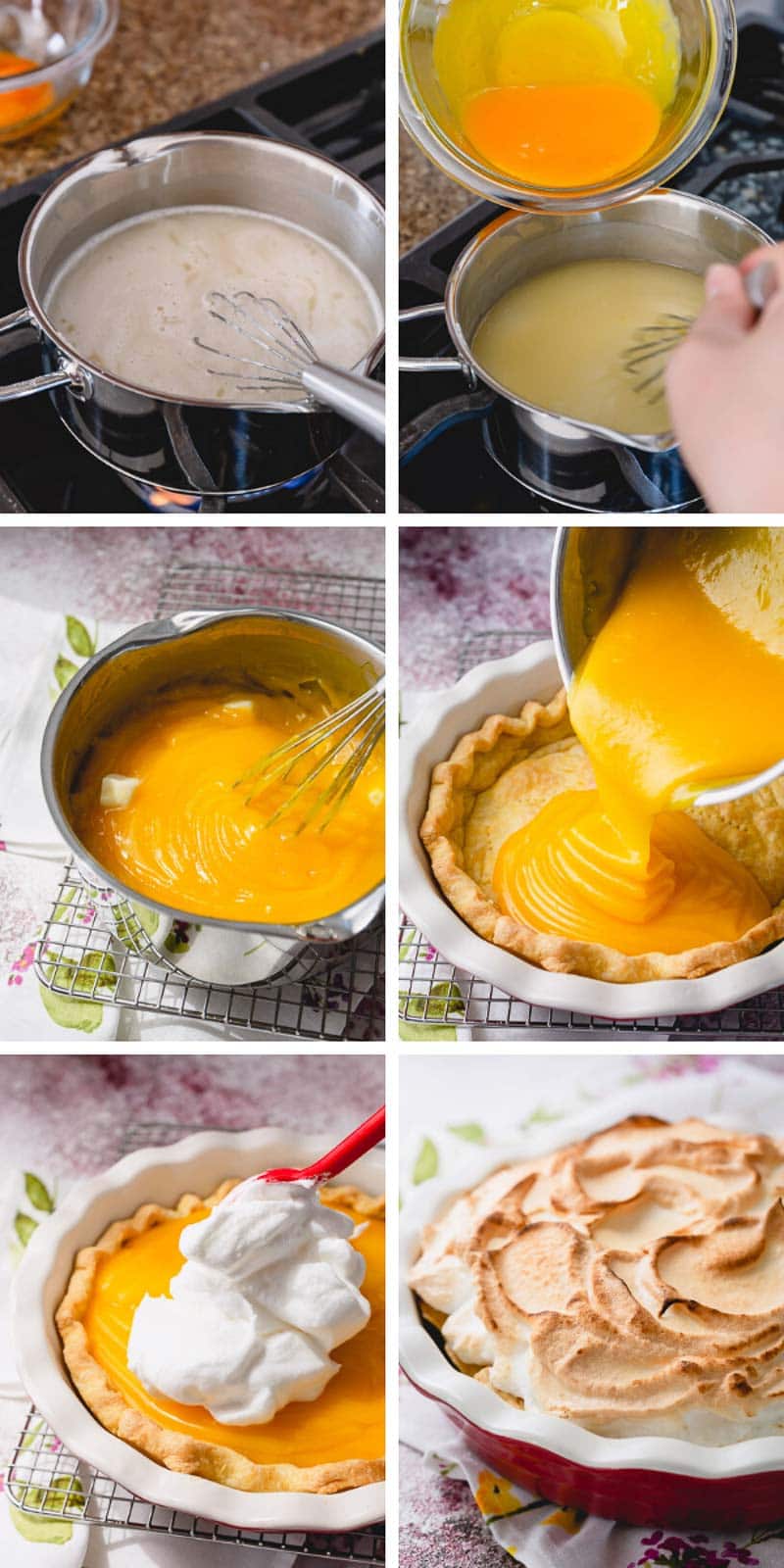
How to make lemon meringue pie crust:
Though you can make this pie with graham cracker crust, I personally love my lemon meringue pie with buttery flaky pie crust.
- First, we need to blind bake the pie crust. This’s super important step to prevent a soggy, undercooked pie crust.
Here’s my detailed homemade all-butter pie crust recipe. And you can prepare the pie crust and blind-bake it in advance.
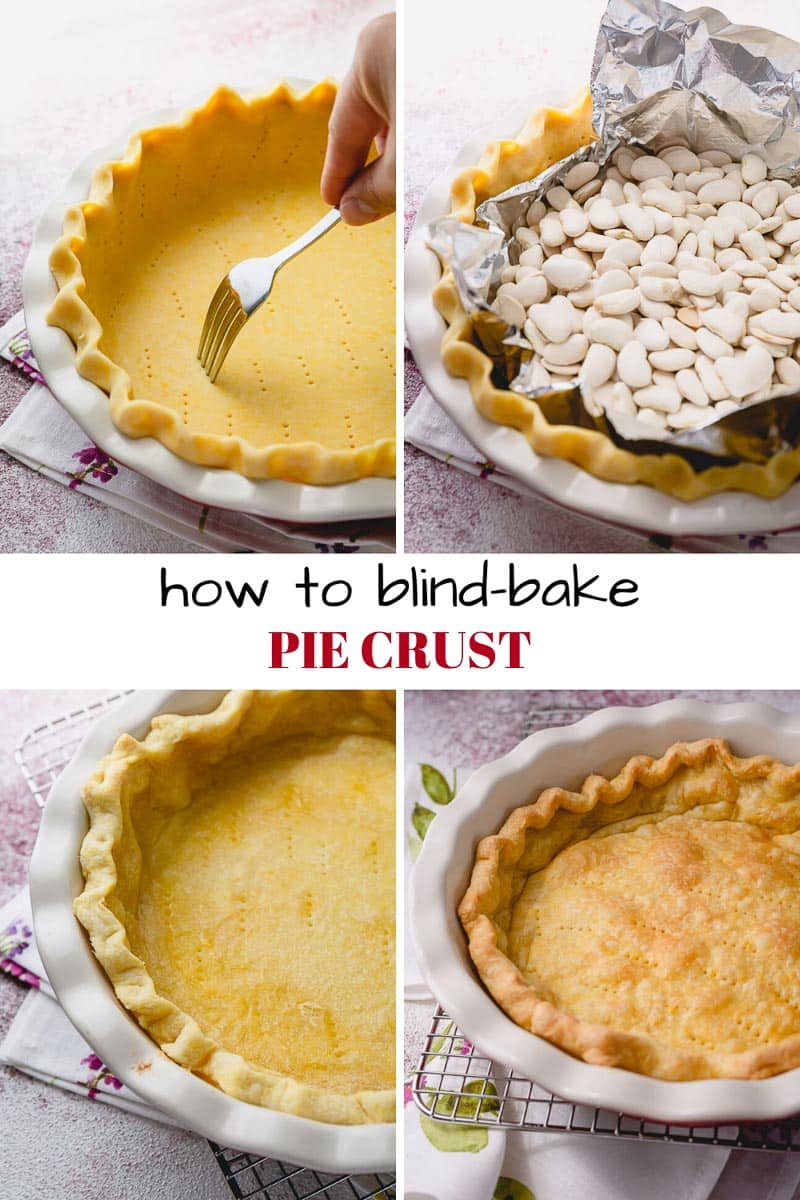
How to make lemon meringue pie filling:
Now, the lemon curd filling is the star of the show here. You want your filling just sweet enough to balance out the tartness, soft yet firm enough to hold its shape when sliced, and silky smooth!
And to achieve that perfect consistency, we’re using a combination of cornstarch and flour. The reason for flour is that in case, cornstarch weakens and doesn’t work, flour is there for a backup, if you will.
What is tempering egg yolks?
Egg yolk makes this filling luxuriously thick and creamy. In order to avoid scrambling the yolks when adding it to the boiling sugar/lemon juice mixture, we need to temper it first.
- While it may sound complicated, tempering simply means adding a small amount of hot liquid into the yolks while continuously whisking it.
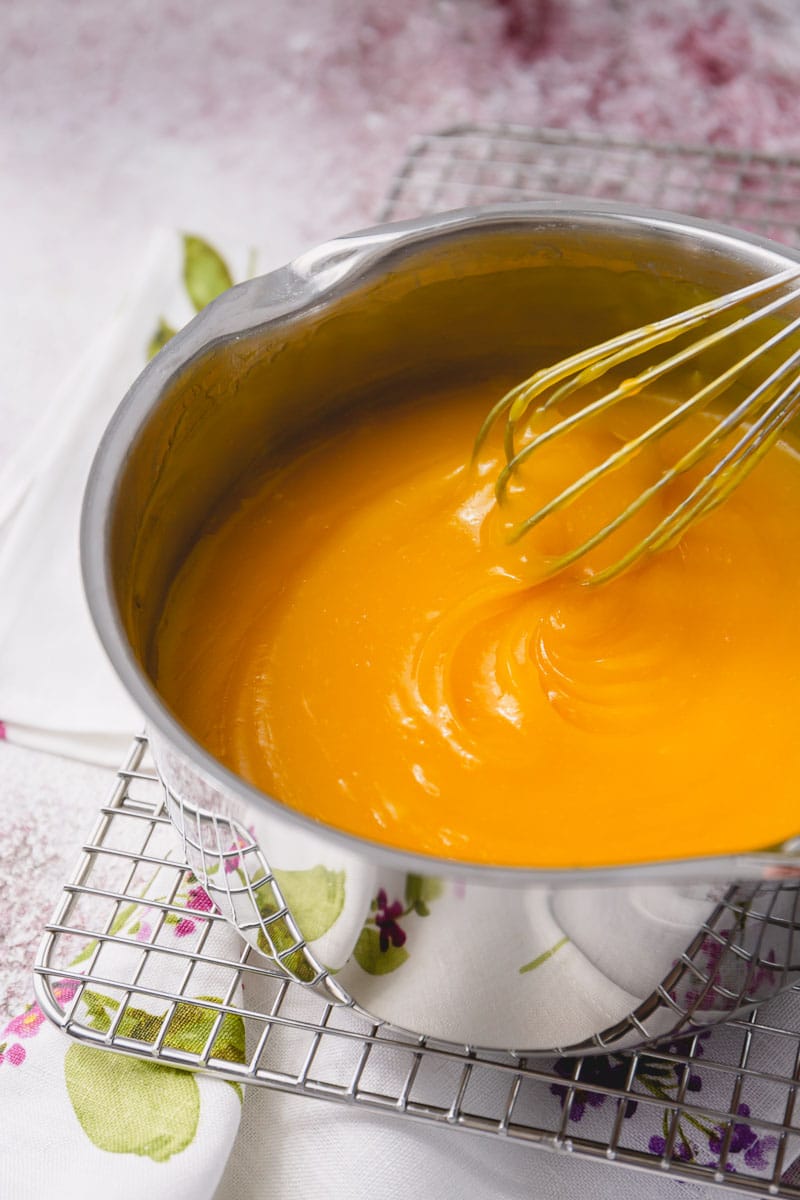
How to make meringue topping:
We’ll make the meringue topping using French meringue method, which basically means whipping the egg whites until soft peaks and then adding sugar a little at a time and whip the meringue until stiff peaks. It’s the easiest way to make a meringue!
4 Tips to make perfect meringue:
- Make sure the mixing bowl and whisk are super clean and free of any oil/fat residue.
- Be careful when separating egg whites and yolks. You don’t want even smallest drop of yolk in your egg whites. Egg yolk is fat and it’ll compromise the meringue structure
- Room temperature egg whites whip faster and achieve better volume. Simply let the egg whites sit on the counter for about 30 minutes.
- Be careful not to over-whip the meringue. Stop as soon as it holds a peak when you lift the mixer.
Because we’re not using much sugar in meringue, it’s really easy to over-whip the meringue.
Over-whipping the meringue will cause 2 issues:
- It’ll be hard to spread overly thick meringue.
- The meringue will start breaking, causing weeping.
Tips to prevent weeping meringue:
- Cornstarch – adding a little bit cornstarch in the meringue stabilizes the meringue preventing it from weeping even on a hot day.
- Cover the pie with meringue while the lemon filling is piping hot. That way piping hot filling cooks the meringue from the bottom, preventing the meringue from breaking down.
I learned these tips from “The New Best Recipes” book from America’s Test Kitchen.
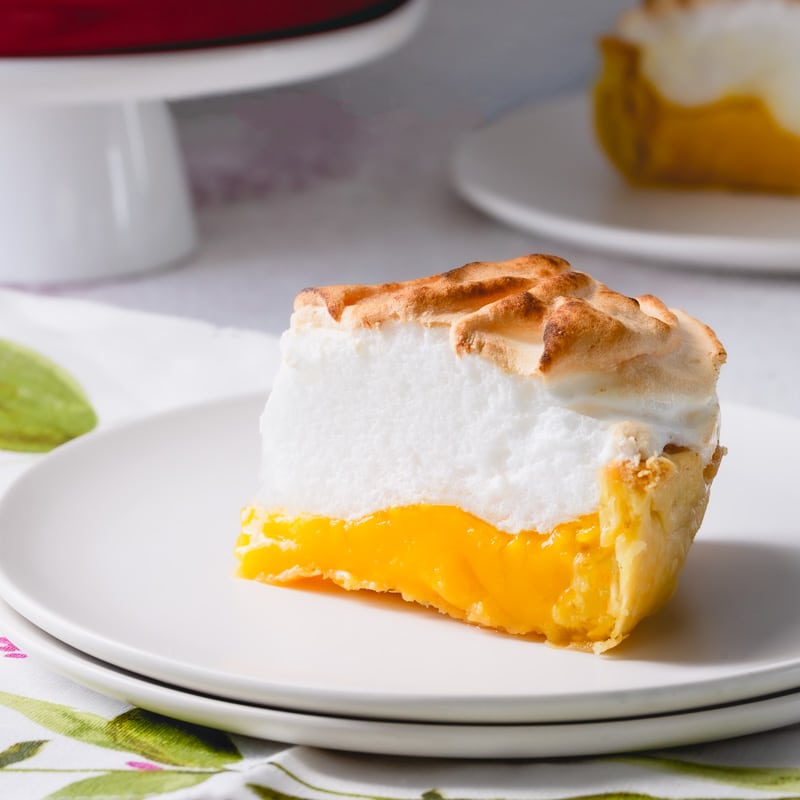
HOW TO CUT LEMON MERINGUE PIE NEATLY:
So, if you ever attempted to slice a meringue topped pie before, you know it’s a tricky business. The meringue tends to stick to the knife, tearing the beautiful topping.
Well, guess what? I did some testing and found the perfect way to cut a perfect slice of meringue pie! No need to butter that knife!
- Grab a serrated knife.
- Gently score a line where you want to cut with a small back and forth motion.
- Then cut all the way down, wiping the knife with a moist towel between each slice for even more perfect slice.
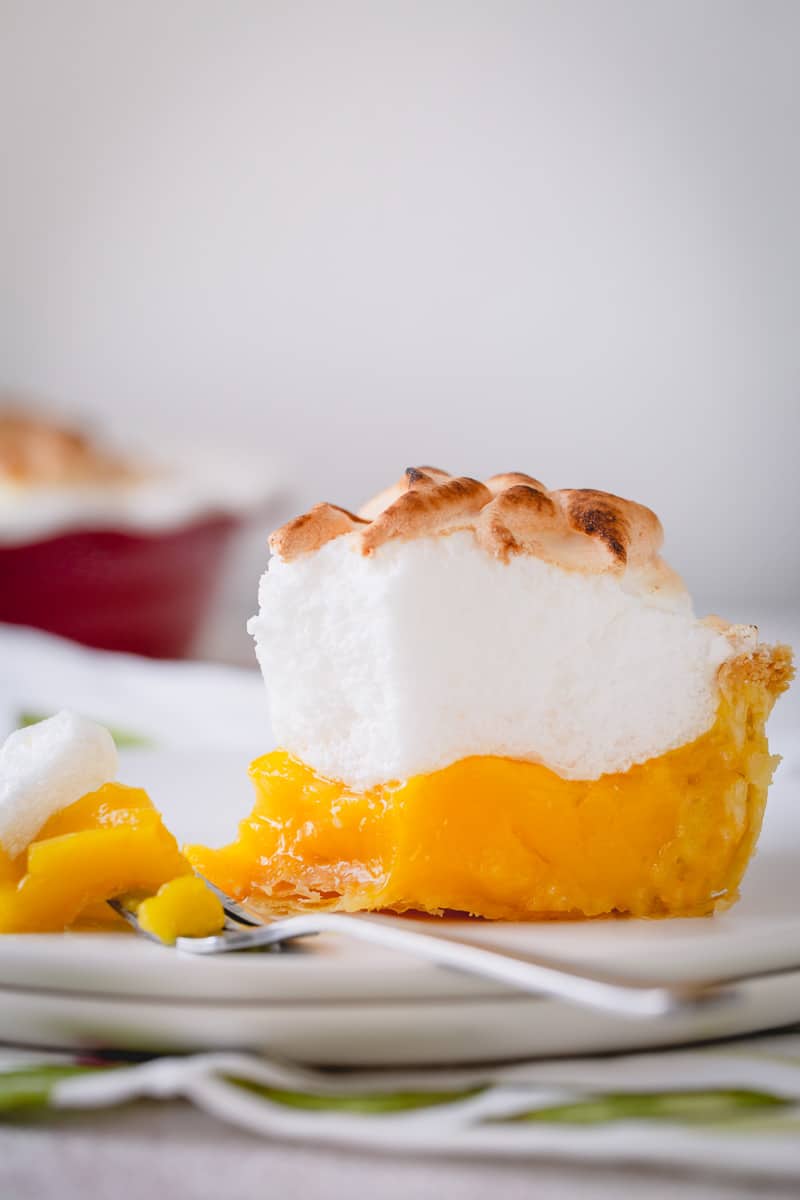
Lemon Meringue Pie Troubleshooting
There’re a few common issues when it comes to lemon meringue pie. Let’s discuss each problem and how to prevent them.
Issue #1: Runny filling
- Cornstarch is the main thickening agent in the filling. It activates at boiling temperature, but looses its thickening ability when it’s boiled for too long, or at too high temperature. Therefore, we are adding flour along with cornstarch as a backup. Be sure not to overcook the mixture though.
Issue #2: Weeping
- Weeping is when water is pooled between pie filling and meringue topping. The most frustrating issue of all. In order to prevent this issue, make sure that the lemon filling is hot from the stove when you spread the meringue over the filling. The hot filling will cook the meringue from the bottom which will prevent watery pie. This is why I recommend to prepare the meringue before you start with the filling.
Issue #3: Shrinking
- Shrinking is when meringue topping shrinks at the edges exposing the filling. To prevent this issue, do spread the meringue over the crust making sure that the edges are sealed all around.
Issue #4: Beading
- Beading is when small droplets of water appear on the surface of the pie. In my mind, this is not really an issue. It happens due to moisture. To minimize this, we are adding cornstarch in the meringue, because cornstarch also absorbs excess water. Also, avoid over-baking the pie and don’t put a warm pie into the fridge.
Equipped with all these tips and tricks, I’m confident you will get a perfect pie every time.
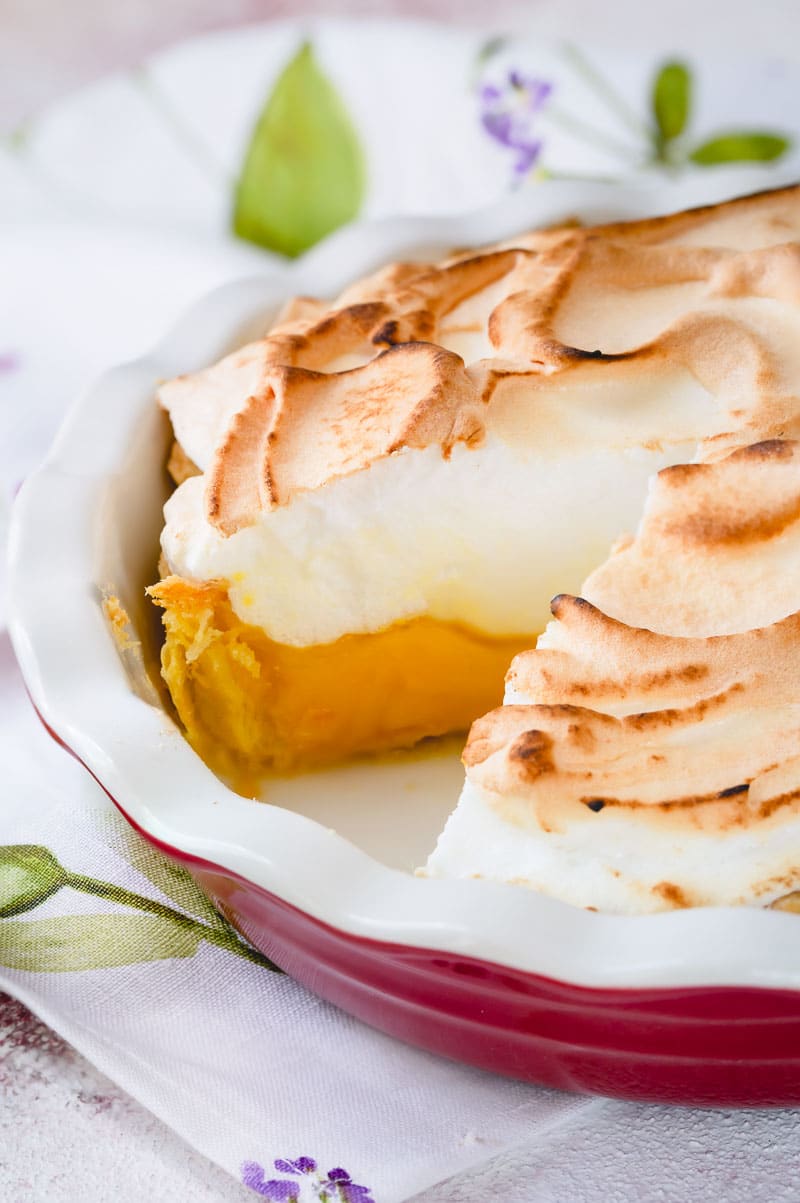
How to store lemon meringue pie:
Do you have to refrigerate lemon meringue pie?
Yes. Leftover lemon meringue pie should be refrigerated, covered.
How do you store lemon meringue pie overnight?
Store lemon meringue pie in the fridge, covered. That being said, lemon meringue pie is best when served the same day, because meringue topping doesn’t hold its prime shape for too long.
Can you make meringue ahead of time?
No, meringue is best when made right before it’s used.
Can you freeze lemon meringue pie?
No, unfortunately, I don’t recommend freezing a lemon meringue pie, because it’ll alter the texture of the filling and meringue. Meringue will turn gummy and chewy.
Although lemon meringue pie is always associated with spring/summer for me, I’ve occasionally served it for Thanksgiving too. (I’m telling ya, it’s a family favorite!) And I hope you’ll give this recipe a try.
Enjoy!
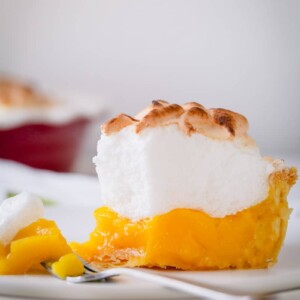
Lemon Meringue Pie
Ingredients
FOR FILLING:
- 1 cup (240ml) water
- 1 cup (200g) sugar
- ½ cup (120ml) fresh lemon juice
- 3 tablespoons cornstarch
- 2 tablespoons all-purpose flour
- 1 tablespoon lemon zest
- ¼ teaspoon salt
- 2 tablespoons (30g) unsalted butter
- 4 egg yolks
FOR MERINGUE:
- 4 egg whites
- 6 tablespoons sugar
- 1 tablespoon cornstarch
Instructions
- To prepare the pie crust, preheat oven to 375°F (190°C).
- Roll the pie crust into 10-inch circle on floured surface.
- Transfer it to 9-inch pie pan, fold the edges and pierce holes with a fork.
- Now we need to blind-bake the crust to prevent the crust to puff up. In order to do that, cover the crust with a foil and pour raw rice or bean on top (or pie weights).
- Bake for 15 minutes. Then remove the foil with rice/beans and bake for another 15-20 minutes, or until golden brown.
- To make the meringue, in a small bowl, whisk together sugar and cornstarch.
- In a large mixing bowl with whisk attachment, beat egg whites until foamy.
- Then slowly add sugar mixture one tablespoon at a time and continue to beat on medium high speed until hard peaks form. Set aside.
- To make the lemon curd filling, in a medium saucepan, mix together water, lemon juice, sugar, cornstarch, flour, lemon zest and salt. Bring the mixture to a boil over medium heat, stirring constantly.
- To temper egg yolks, add about half cup of lemon juice mixture into the egg yolks and stir vigorously. Return the egg mixture back to the saucepan. Continue cooking for 3-5 minutes, continuously stirring.
- Throw in the butter.
- While butter is melting in the filling, briefly whisk the egg whites for a minute.
- To assemble the pie, transfer the hot filling into pre-baked pie crust and immediately spread the meringue over the filling making sure to seal the edges.
- Bake the pie for 8-10 minutes, or until meringue is golden brown.
- Cool completely on wire rack at room temperature, 1-2 hours, before serving.
Nutrition
This post was originally shared on January 3, 2013, and last updated on June 15th, 2020.
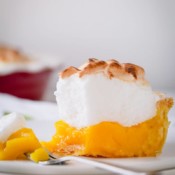

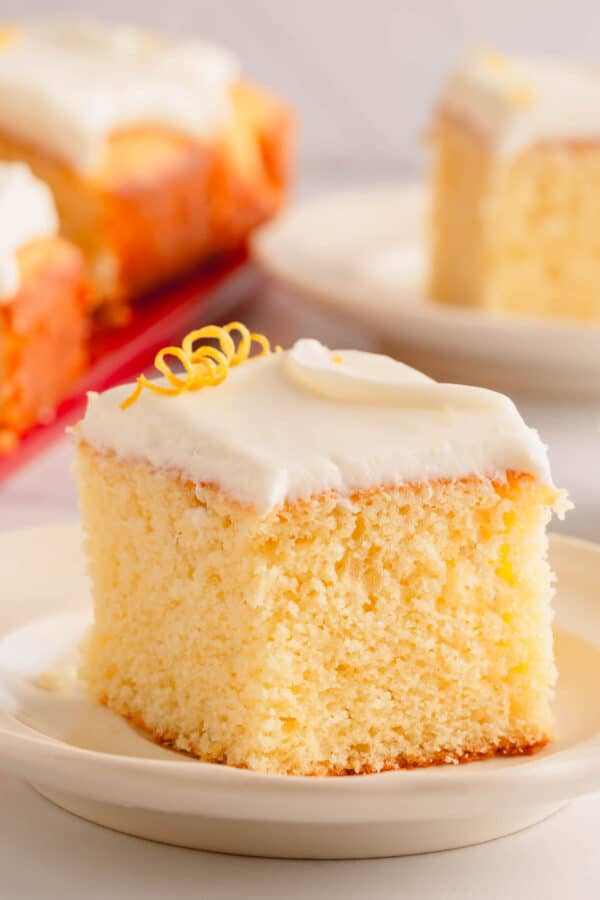
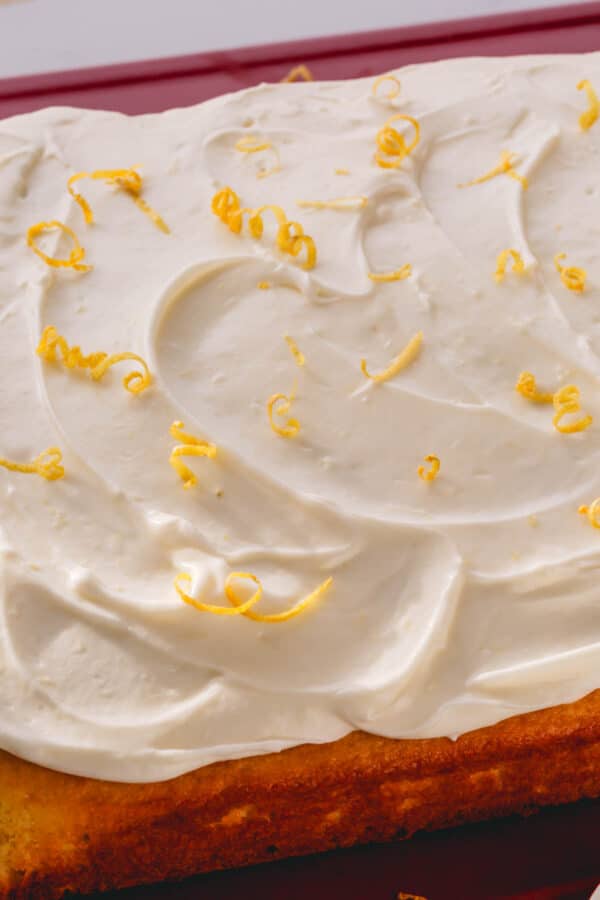
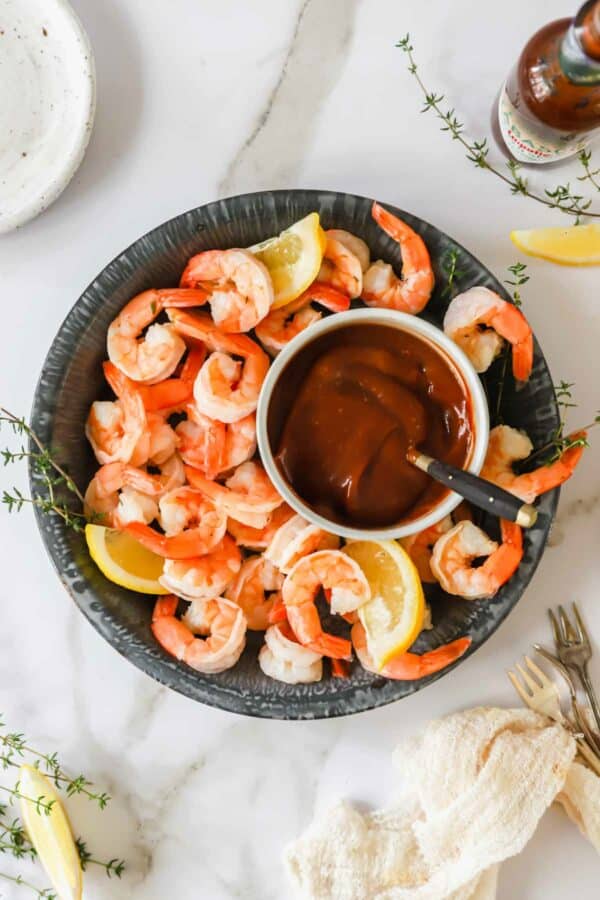
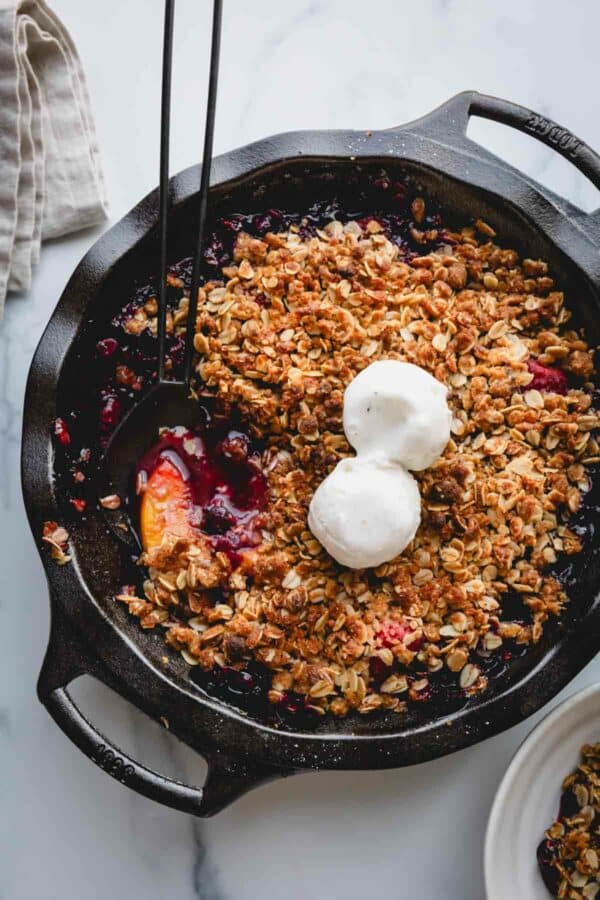

What can I use to sub cornstarch?
Great recipe – tastes like I remember my mom used to make.